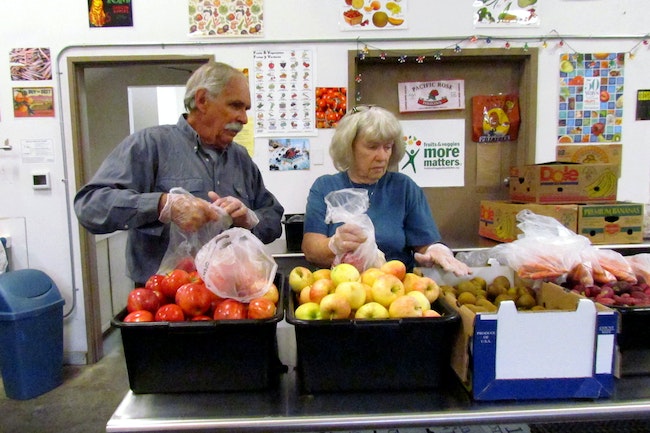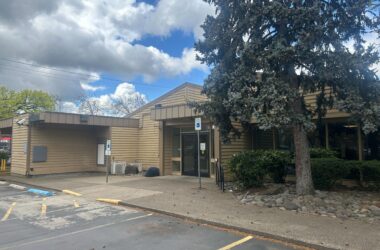 CHRONICLE FILE PHOTO The Creswell Food Pantry is among nonprofits that have made adjustments to continue serving residents during the pandemic.
CHRONICLE FILE PHOTO The Creswell Food Pantry is among nonprofits that have made adjustments to continue serving residents during the pandemic.
“The Great Recession of 2008 changed nonprofit fundraising forever, and now COVID-19 is accelerating that change going forward.”
That statement was where my conversation began with Christina Lund, principal of Lund Development Solutions, a long-time nonprofit fundraising professional for entities in Cottage Grove and throughout the state.
I wanted to find out how nonprofits are weathering the generational storm that is the global pandemic, and Lund offered a great perspective on how some of the most resilient organizations she’s worked with are surviving and, in some cases, thriving.
“If we go back ten years, the entire nonprofit industry experienced a fundamental shift in fundraising because the economy was so negatively impacted,” said Lund. “Every quarter, we were seeing nonprofits having to change the way they courted donors, applied for grants, and did nearly everything just to keep up with the shifting, and even collapsing, landscape of available dollars. And while it was incredibly difficult, we saw a real entrepreneurial spirit develop amongst nonprofits that truly began to embrace technology and cultivate new generations of funders.”
Lund – who has been instrumental in the fundraising efforts for such notable projects as SquareOne Villages, the Eugene Family YMCA, and the Cottage Grove Armory – said that the harsh realities of COVID-19 have a similar feel to the recession of a decade ago.
“Generally speaking, most nonprofits have had to change and innovate, whether it was finding alternative funding sources, delivering new services, or migrating to online service delivery,” she said referring to the past 18 months. “While it has been extremely difficult, those organizations applying certain fundamentals have truly come out OK, if not even better than before.”
These fundamentals, and a core part of Lund’s consulting services, have a central operating principle: discipline and focused planning.
Lund explained to me the four key tenants of this principle, and my hope is that these 50,000-foot view ideas might help organizations looking for new ways to improve their fundraising programs.
First, every organization must (b) have its financial house in order before a crisis hits.(b) This simply means that every nonprofit must practice disciplined financial accounting 365 days per year. If a disaster strikes that is out of an organization’s control, having solid financial control inside the house is an absolute must. Imagine being battered by raging seas after a shipwreck, but you are secure inside a robust and seaworthy lifeboat. Suddenly, the picture is far less bleak.
Next, (b)do everything possible to build the best leadership structure. (b) Lund points out that many nonprofits that had to close their doors during the pandemic, also experienced an exodus of board members and staff. If a nonprofit develops great leaders—at the board and staff levels, but also at the volunteer and donor levels—it will be able to rely on the strengths of these leaders to manage through the crisis. There will be no need to jump ship.
Third is to (b) create an adaptable and autonomous fundraising plan that doesn’t rely on outside help. (b) Lund told me that early on during the pandemic, she had a conversation with one of her clients and let them know that they were truly on their own to pave their own way. Traditional fundraising practices were not going to be enough, and that no fundraising professional was going to come to their rescue. While this might seem like a harsh warning, she said that many of her clients welcomed the opportunity to roll up their sleeves and develop a fundraising plan that could easily adapt to outside circumstances. For example, many organizations have transitioned to online fundraising events, instead of in-person events, to meet their fiscal needs. Some even added new fundraising positions that were solely focused on stewardship and communication.
Finally, Lund points out that successful organizations are those that (b) commit to never stop fundraising, no matter the circumstance. (b) “I heard of some nonprofits who thought it was best to take a break from fundraising during the start of the pandemic,” she said. “That was often a big mistake and cost some organizations dearly. If you look back over the last four years starting in 2017, nonprofit fundraising was larger in each successive year up to 2019. Then, in 2020 (during the pandemic) it rose again. People want to give to organizations they believe in, and an organization needs to engage with people who support their important mission.”
I finished my chat with Lund by asking her what the future might hold for nonprofits and fundraising. Not surprisingly, she took a realistic yet optimistic view.
“Look, I’ve stopped using the word ‘pivot’ to describe how nonprofits should take action. We are nowhere near the end of this crisis, so we should stop using words that connote a simple shift in tactics. This is the new normal. Nonprofits need to focus on sound planning and executing fundamentals, which is going to help them get through this difficult time and come out stronger in the end.”
In Creswell, a local organization called Creswell First!, provides funds to organizations helping families in Creswell. According to its President, Steve Carmichael, “We are one of the funding sources for those organizations. Our funds come from city funding, other foundations, and private gifts to Creswell First!. People who want to help families and children, can give Creswell First! donations through our ‘One Stop Giving’ program. Donations can be made at our website: www.creswellfirst.com.”
Christina Lund is the principal and founder of Lund Development Solutions, Inc. Her office is in Eugene. She and her husband are also business owners in Cottage Grove.
Email: [email protected]







